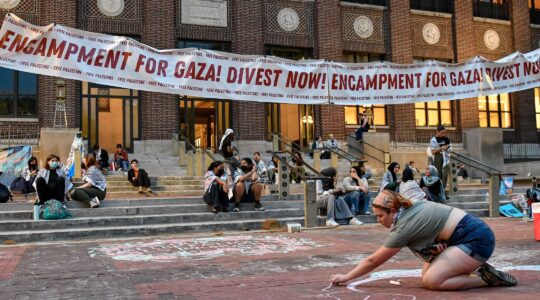NEW YORK (JTA) – Less than half of American rabbis are optimistic about the future of American Jewry and less than a third expect synagogue membership in the United States to increase over the next three years.
Those were among the more startling findings of a national rabbinic survey conducted this summer by STAR, Synagogues: Transformation and Renewal, a Minnesota-based group that promotes innovative congregational programming and leadership development.
The survey was sent to 303 rabbis who participated in one of three STAR initiatives; 187 responses were received from across the denominational spectrum.
“While synagogue growth is always on the minds of rabbis, this year’s survey reveals a heightened concern,” said Rabbi Hayim Herring, STAR’s executive director. “Shifting denominational affiliations and larger numbers of interfaith families are challenging synagogue growth and rabbis keenly recognize their role is not just about increasing ongoing membership participation, but reaching out beyond current congregants by attracting a more diverse community.”
Only 47 percent of respondents said they remain optimistic about the future of American Jewry, while 28 percent said they expect synagogue membership in the United States to increase over the next three years, a decline from 34 percent last year.
In a reflection of growing concern over synagogue engagement, participation in Jewish life beyond High Holidays services has replaced Israel as the top-ranking sermon topic this year. Last year, support for Israel was the country’s top sermon topic, with 72 percent of rabbis saying they intended to talk about it. This year, 45 percent planned to talk about broader Jewish participation, followed by forgiveness at 41 percent and the internal life/health of the synagogue at 37 percent.
Reflecting these priorities, the top sermon goal this year by a wide margin is inspiring congregants with a compelling vision of Jewish life, 66 percent, followed by bringing the congregational community closer together, 11 percent, and increasing the level of ethical behavior, 9 percent.
In a related finding, the survey reported that 92 percent of rabbis believe there is a need to reach out to historically less-involved constituencies, including gays and lesbians, interfaith couples and singles.
Concern over synagogue participation is reflected as well in the lessened sense of urgency regarding Israel. Last year’s survey, conducted shortly after Israel’s war with Hezbollah in Lebanon, reported 32 percent of rabbis believed Israel-related issues were the most pressing issue facing American Jewry. This year, the number declined to 7 percent.
Israel was replaced as the top issue by “making Judaism more relevant,” 35 percent, followed by “involving more people in Jewish organizations or activities,” 14 percent, and “involving more people in synagogue life,” 12 percent.
“The findings indicate that Israel is still in the hearts and minds of rabbis, but they are looking at broader issues as well,” Herring said.
“The battle to keep Judaism relevant may be more of a concern right now, but as the presidential election gets under way and global issues heat up, it is clear the U.S. Jewish community will be ready to act on behalf of Israel, and the synagogue is perhaps the key venue for Israel activity, education and advocacy.”

Help ensure Jewish news remains accessible to all. Your donation to the Jewish Telegraphic Agency powers the trusted journalism that has connected Jewish communities worldwide for more than 100 years. With your help, JTA can continue to deliver vital news and insights. Donate today.





